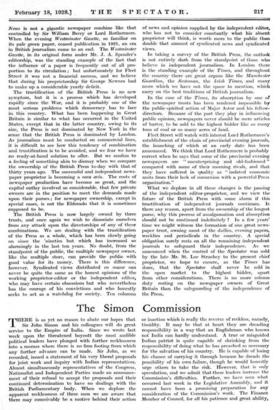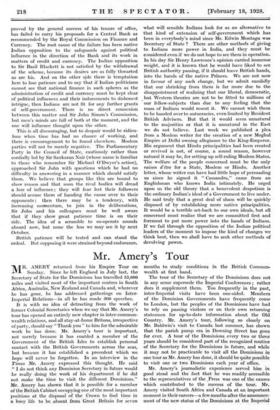The Simon Commission T HERE is as yet no reason to
abate our hopes that Sir John Simon and his colleagues will do great service to the Empire of India. Since we wrote last week upon the threatened boycott the most audible political leaders have plunged with further recklessness into a morass where there is no firm footing from which any further advance can be made. Sir John, as we recorded, issued a statement of his very liberal proposals for joint work and inquiry with Indian representatives. Almost simultaneously representatives of the Congress, Nationalist and Independent Parties made an announce- ment of their refusal to accept the proposals and their continued determination to have no dealings with the British Parliamentary body. When we deplore the apparent recklessness of these men we are aware that there may conceivably be a motive behind their action or inaction which is really the reverse of reckless, namely, timidity. It may be that at heart they are dreading responsibility in a way that an Englishman who knows not India can hardly understand: A true or misguided Indian patriot is quite capable of shrinking from the responsibility of doing what he has preached as necessary for the salvation of his country. He is capable of losing his chance of carrying it through because he dreads the possibility of his own failure, though he would honestly urge others to take the risk. However, that is only speculation, and we admit that these leaders increase the Commission's difficulties. Further, we have seen what occurred last week in the Legislative Assembly, and it cannot have been a promising preparation for any consideration of the Commission's work. The Finance Member of Council, for all his patience and great ability, proved by the general success of his tenure of office, has failed- to carry his proposals for a Central Bank as recommended by the Royal Commission on Finance and Currency. The root cause of the failure has been native Indian opposition to the safeguards against political influence in the direction of the Bank and its work in matters of credit and currency. The Indian opposition to Sir Basil Blackett is not satisfied by the withdrawal of the scheme, because its desires are as fully thwarted as are his. And on the other side there is temptation here to lose patience and to say that if Indian politicians cannot see that national finance in such spheres as the administration of credit and currency must be kept clear of political influences and their inducements to dishonest intrigue, then Indians are not fit for any further grants of self-government. There is no direct connexion between this matter and Sir John Simon's Commission, but men's minds are full of both at the moment, and the one will influence thought upon the other.
This is all discouraging, but to despair would be ridicu- lous when time has had no chance of working, and there is encouragement to be found elsewhere. Moslem parties will not be merely negative. The Parliamentary Party in the Council of State, cautiously rather than cordially led by Sir Sankaran Nair .(whose name is familiar to those who remember Sir Michael O'Dwyer's action), approached Sir John with questions which he had no difficulty in answering in a manner which should satisfy them. We believe that groups like this are bound to show reason and that soon the rival bodies will dread a loss of influence; they will fear lest their followers should accuse them of handing the cause over to their opponents ; then there may be a tendency, with increasing momentum, to join in the deliberations. Sir John and his colleagues must be well aware that if they show great patience time is on their side. The idea of a scramble to co-operate sounds absurd now, but none the less we may see it by next October.
British patience will be tested and can stand the ordeal. But supposing it were strained beyond endurance, what will sensible Indians look for as an alternative to that kind of. extension of self-government which has been in everybody's mind since Mr. Edwin Montagu was Secretary of State ? There are other methods of giving to Indians more power in India, and they must be considered even if we do not hope to see them in operation. In his day Sir Henry Lawrence's opinion carried immense weight, and it is known that he would have liked to see British authority passing, if it should leave British hands, into the hands of the native Princes. We are not now in favour of any such change, but we admit candidly that our shrinking from them is far more due to the disappointment of realizing that our liberal, democratic, but Western theories are not to be fitted to millions of our fellow-subjects than due to any feeling that the mass of Indians would resent it. We cannot wish them to be handed over to autocracies, even limited by Resident British Advisers. But that it would seem unnatural to the majorities or that it is unnatural in the East we do not believe. Last week we published a plea from a Moslem writer for the creation of a new Moghul Empire at Delhi owning allegiance to the King-Emperor. His argument that Hindu principalities had been created or revived is not, of course, a sound reason, however natural it may be, for setting up self-ruling Moslem States. The welfare of the people concerned must be the only raison d' &re for a State, Moslem or Hindu. Another letter, whose writer can have had little hope of persuading us since he signed it " Cassandra," came from an Englishman who knows India intimately. He urged upon us the old theory that a benevolent despotism is the ordinary Indian's ideal of a Government to live under. He said truly that a great deal of sham will be quickly disposed of by establishing more native principalities. It would be a terrible set-back to our own ideals, but all concerned must realize that we are committed first and foremost to put more power into the hands of Indians. If we fail through the opposition of the Indian political leaders of the moment to impose the kind of changes we think best, then we shall have to seek other methods of devolving power.







































 Previous page
Previous page